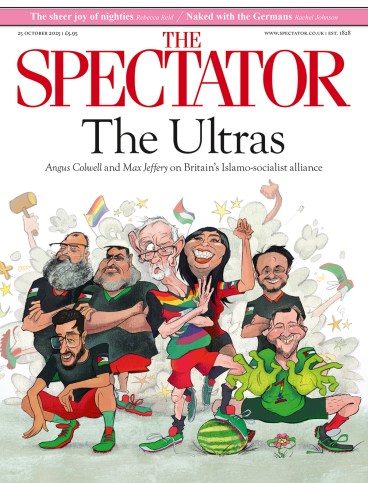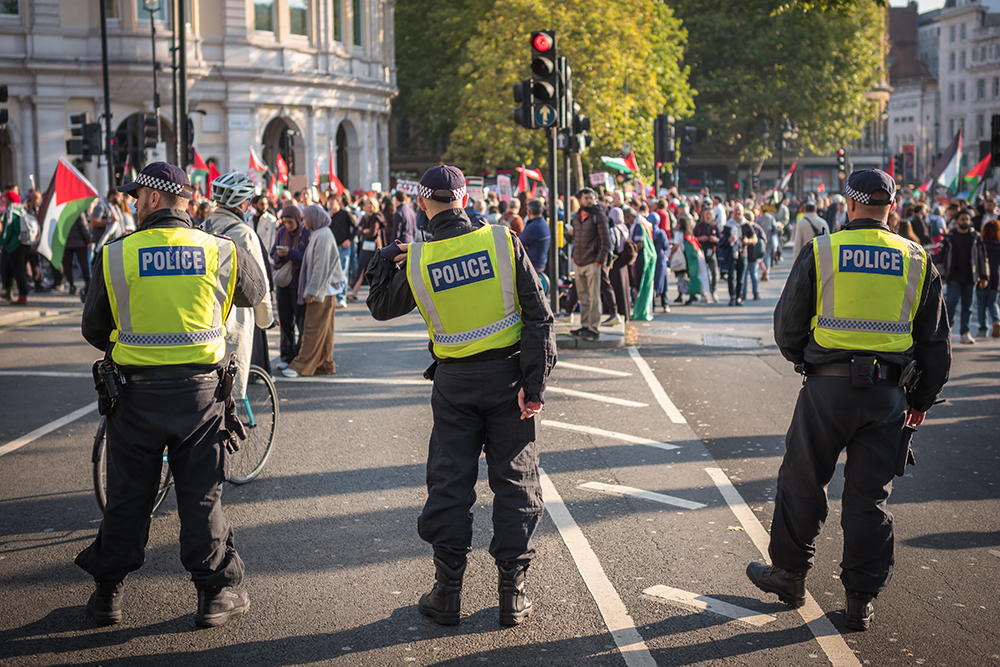
After two years of war, and despite Israel’s many successes on the battlefield, Hamas can also claim a kind of victory – at least for now. The terror group has survived and is once again exerting control in the areas of Gaza under its authority. Public executions, whippings, stonings and kneecappings have returned. In the first five days of the ceasefire, Hamas executed at least 100 Gazans.
Hamas’s survival was achieved not only through its remaining fighters and its holding of hostages, but also thanks to a chorus of western apologists. A coalition of so-called progressives and professional activists has excused, rationalised and defended the group’s actions across universities and in newspaper editorials. The BBC, Sky, the Guardian, the FT and the New York Times have all parroted Hamas talking points.
Tales of impending famine in Gaza, for instance, were broadcast as fact, sourced from UN bureaucrats and ‘aid agencies’ with long records of anti-Israel bias and, in some cases, open sympathy for Hamas. This isn’t journalism: it’s agenda-driven activism disguised as news. What the BBC and others failed to grasp is that, for Hamas, the western media is the battlefield – no less important to its survival than its rockets and tunnels.
While Israel was forced into a military campaign to protect its citizens, Hamas launched a far more cynical war, sacrificing Palestinians by firing rockets from dense civilian areas and daring Israel to respond. Their aim was to trigger international pressure for a ceasefire so as to restore the flow of weapons for their operations.
From the outset, even before Israeli troops had entered Gaza, Hamas’s operatives and sympathisers in the West were shouting about ‘genocide’ and ‘famine’. It was a propaganda trap – and the western media walked right into it.
Consider, for example, these headlines from the early weeks of the conflict in 2023:
11 October: Fuel in Gaza will run out in 48 hours
15 October: Fuel in Gaza will run out in 48 hours
30 October: Fuel in Gaza will run out in 48 hours
6 November: Fuel in Gaza will run out in 48 hours
The pattern speaks for itself. It’s been the same story with Gaza being ‘on the brink of famine’ for the past two years. This is how it works:
Step one: The Hamas ‘health ministry’ makes up a casualty number which could be debunked by the most cursory statistical analysis.
Step two: Aid organisations repeat the number without independent confirmation.
Step three: UN agencies in Gaza (some staffed by Hamas members) cite the aid organisations.
Step four: Media outlets quote the UN agencies.
Step five: Hamas’s supporters in the West claim the numbers are ‘UN verified’.
UN officials have also contributed to the fiction directly. In May, Tom Fletcher, a humanitarian coordinator for the organisation, told BBC Radio 4: ‘There are 14,000 babies that will die in the next 48 hours unless we can reach them.’ Almost no babies died as a result of the war in the following days. But that didn’t stop the BBC running the claim in bulletins and news outlets around the world repeating it, citing the BBC as a reliable source.
Some of the most widely shared images of ‘starvation in Gaza’ were from Yemen
The Hamas narrative has been amplified, too, by disinformation campaigns driven by Iranian, Russian and Chinese state-linked bots on social media, which have exploited Gaza as a means of destabilising western societies. These regimes understood how easily such narratives could tap into a pre-existing willingness among many in the West to believe anti-Semitic libels.
This tactic isn’t new. The Tsarist secret police famously forged The Protocols of the Elders of Zion to incite anti-Semitism, and the Soviet KGB spread anti-Zionist propaganda into western media and academia during the Cold War. In the Middle Ages, pogroms were fuelled by fabricated claims of Jews killing Gentile babies. Today, similar falsehoods are disseminated by journalists, academics and UN officials – cloaked in the language of human rights but echoing ancient prejudices.
Why were Hamas’s inflated casualty figures reported as facts? Why were incorrect claims of Israel bombing hospitals repeated without scrutiny – while confirmed cases of Hamas rockets hitting Israeli hospitals in Ashkelon and Beersheba were ignored? In part, this was down to journalistic complacency. The facts were accessible. Thousands of authentic Palestinian social media accounts from Gaza showed everyday life continuing, with cafés, restaurants, supermarkets, even beauty salons all operating, contrary to claims of complete destitution.
Independent researchers discovered that some of the most widely shared images of ‘starvation in Gaza’ were from Yemen. One prominent photo showing a skeletal child was highlighted by the media as evidence of famine. In reality, the child wasn’t malnourished due to famine. He had cerebral palsy, hypoxemia and other genetic conditions. The image was cynically selected to exclude his healthy sibling. Its source? An Islamist outlet in Turkey. That didn’t prevent the Guardian, Times and New York Times running it on their front pages, inflaming the emotions of millions of readers. The New York Times later slipped in a discreet correction, but by then the damage was done. Despite its substantial resources, the much-touted BBC Verify unit missed many of these falsehoods.
There has, of course, been great suffering in Gaza, as in any war. But that doesn’t justify using misleading photos, fake stats and Hamas-supplied images to condemn Israelis as child murderers.
The good news? Large swaths of the British public aren’t buying it. Scroll through the reader comments under articles about Israel, and you’ll find thousands of ordinary people who haven’t lost their critical faculties. They know casualty figures from terrorist regimes aren’t a sacred truth. They can spot propaganda when they see it.
Unlike some intellectuals, they don’t lose all logic the moment the word ‘Israel’ is uttered. As George Orwell once quipped: ‘You must be an intellectual. Only an intellectual could believe something quite so stupid.’ Today, he might have aimed that line at Guardian readers or BBC news staff.
In this war, it is not Israel or even Hamas that has lost its purpose, but the media.








Comments